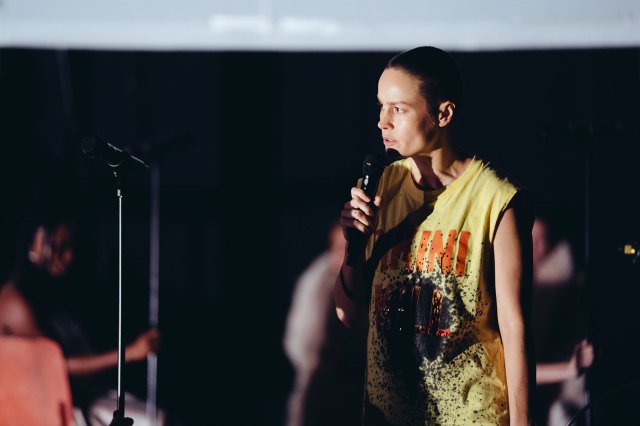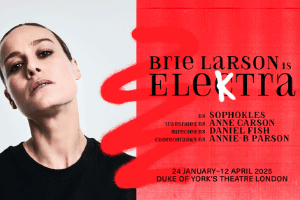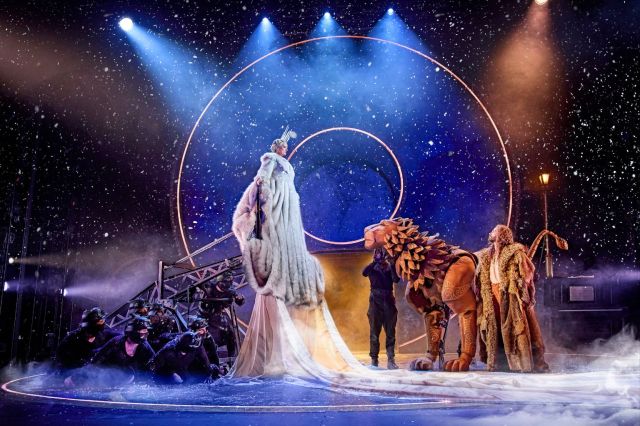Elektra West End review – Brie Larson leads an abstract, elusive revival
Daniel Fish’s production runs at the Duke of York’s Theatre until 12 April

Another night and another Greek tragedy unfolds in London theatre-land – with another Oscar-winning star taking top billing.
After the expansiveness of Oedipus at the Old Vic, complete with dancing chorus, this version of Sophocles’s Elektra specialises in stripped back starkness – and comes with a singing chorus in true Greek style. Oedipus brought Rami Malek’s take on a doomed king; Elektra offers a shaven-headed Brie Larson as its heroine bent on revenge.
The play is directed by Daniel Fish, whose Oklahoma! on both Broadway and at the Young Vic, was one of my favourite productions ever. His restless intelligence and questioning determination to look at classics in a new light are also on display here. But the production, full of strangeness and insight, feels half-baked, as if all its elements haven’t quite had time to gel. It simultaneously compels attention and frustrates it.
Its most fascinating quality is the way in which it combines the Greek and the contemporary. Jeremy Herbert’s set surrounds a circular revolving platform with a white funnel scored with black lines, that rises and falls to reveal the bare walls behind. Larson, in a “Bikini Kill” T-shirt and jeans, prowls the space, brandishing a microphone like a proto punk. The chorus move their microphone stands into sharp diagonals as they sing Ted Hearne’s haunting, powerful score.
A zeppelin hangs mysteriously overhead, perhaps a reminder of the today’s climate of surveillance, but this is a world where the seen and unseen are inextricably joined: words create external sensations. In Ben and Max Ringham’s soundscape and under Adam Silverman’s bleak lights, a gunshot sounds whenever Elektra talks of the murder of her father Agamemnon; a slap greets the mention of her brother Orestes; a spit the name Aegisthus. A jet spurts paint over those who talk about the killing. Towards the close, as the body count rises, a voiceover about tortured bodies introduces modern echoes of warfare and murder.
Elektra is the original avenger – appropriate given Larson’s movie fame as Captain Marvel – and it is her desire to kill her mother Clytemnestra (Stockard Channing) and her lover Aegisthus (Greg Hicks) in rough justice for their slaying of Agamemnon that powers the plot. But Anne Carson’s poetic, prickly translation is equally interested in why Elektra defines herself in this way – “Nothing less than this can cut the evils inside me” – choosing her outsider status, focusing on her mission and her hopes for Orestes.

Fish keeps the relationships between the characters abstract and distanced. Larson’s Elektra can shout louder than anyone, because she is literally the one with the microphone. But her speech is – presumably deliberately – flat. She sings the word ‘no’ every time she says it, and at one devastating point screams it out loud. Yet even when Patrick Vail’s ghostly Orestes finally returns, in billows of smoke, she barely glances at him. Her face remains a blank.
Vail, both as Orestes, and as the messenger who tells of his supposed death in a rat-a-tat monologue, has a melancholy humanity about him, and Hicks brings venom and acceptance to Aegisthus as he meets his fate.
Yet it is still as if they are wearing masks. Lines are spoken out rather than to one another, formalised and ritualistic rather than naturalistic. It is the chorus in their silken dresses who carry most weight, singing their commentary with piercing clarity. There is one moment of deep, astonishing silence when the extremity of the entire play seems to come into sudden focus.
The effect is to turn the piece into an abstract meditation rather than drama, a gloss on Elektra not the thing itself. I rather loved it, but it never quite becomes the sum of its parts.



















